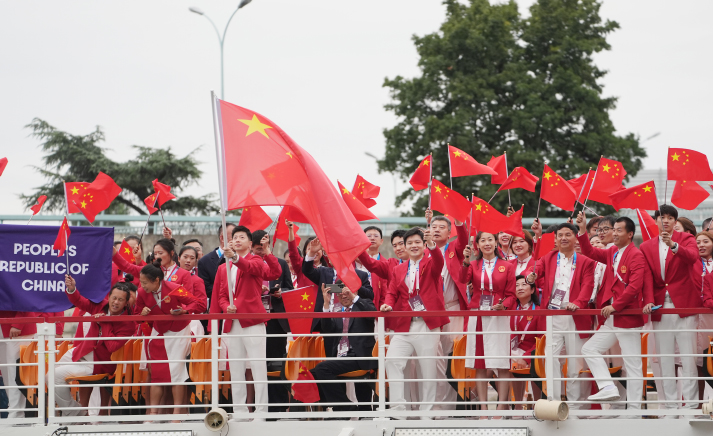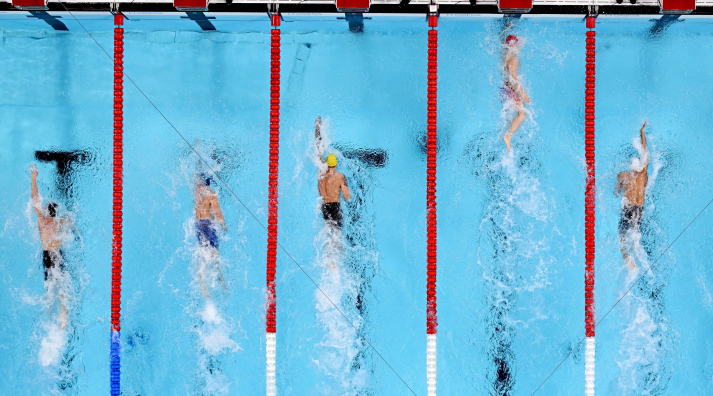| World |
| One hundred years after Paris last hosted the world's top athletes, the City of Light once again welcomes the Summer Olympics | |
|
|
 Members of the Chinese delegation attend the opening ceremony of the 2024 Paris Olympic Summer Games in Paris, France, on July 26 (XINHUA)
The four-hour opening ceremony of the Paris 2024 Olympic Summer Games captivated the world on July 26. Some were dazzled by the sheer spectacle of it all, while seasoned observers delighted in the intricate layers of literature and history woven into the event. The ceremony began in Paris' underground labyrinth of tunnels. A masked torchbearer then made their way through the city, adding an air of mystery to the overall event, which featured many performances paying homage to French art and history. Some more "avant-garde" elements, however, sparked controversy, leading the Paris Olympics organizers to later issue an apology for any offense caused. But there was one thing everyone seemed to agree on: Canadian singer Céline Dion nailed her performance. The 56-year-old French-Canadian singer had not taken the stage in over four years due to a rare neurological disorder known as "stiff person syndrome," which causes uncontrollable muscle spasms. Despite this, Dion had vowed to return one day—and she did. Her rendition of iconic French singer Edith Piaf's Hymne à l'Amour was nothing short of triumphant, earning her the title of a "vocal athlete," as American pop singer Kelly Clarkson remarked during U.S. broadcaster NBC's live coverage of the ceremony. As Dion's voice filled the air, Paris 2024 officially began. French President Emmanuel Macron declared the Games open, followed by the lighting of the Olympic cauldron by two French athletes: judoka Teddy Riner and retired sprinter Marie-José Pérec. "You are bringing our Olympic Agenda reforms to life by making these Games wide open. All of us will experience Olympic Games that are more inclusive, more urban, younger and more sustainable—the first Olympic Games with full gender parity on the field of play," International Olympic Committee President Thomas Bach said in his ceremonial address.  A balloon carrying the lit Olympic cauldron lifts off during the Paris 2024 opening ceremony on July 26 (XINHUA)
In Parisian fashion For the first time in Olympic history, the opening ceremony took place outside the host city's main Olympic stadium. From the Austerlitz Bridge to the Trocadero, around 6,800 athletes, assembled behind their flagbearers, cruised down a 6-km stretch of the Seine River on 85 boats. Paris 2024 marks the city's third time hosting the Olympic Summer Games, following its previous turns in 1900 and 1924. The Games, set to conclude with a grand closing ceremony at the Stade de France, the country's largest stadium, on August 11, see over 10,000 athletes from around the world competing in 329 events across 32 sports. This edition will feature the Olympic debut of breakdancing—referred to as "breaking" at Paris 2024—alongside three other emerging sports: sport climbing, skateboarding and surfing, all of which first appeared at the COVID-delayed Tokyo 2020 Olympic Summer Games in 2021. One of the most remarkable features of Paris 2024 is the design of the medals, which incorporate a hexagon-shaped piece of iron from the Eiffel Tower at their center. This design was unveiled in February and crafted by renowned French jewelry house Chaumet. The organizers, in collaboration with the Athletes' Commission, aimed to create a medal that truly resonated with the athletes, ensuring it was designed not just for them, but with them. And the surprises don't end with the medals. The Olympic track in Paris is a striking purple, departing from the traditional terracotta. According to Maurizio Stroppiana, Vice President of the sports division at Mondo, the Italian tech firm supplying the track, this new surface offers better performance than the one used at Tokyo 2020. Additionally, the track is more eco-friendly, made with more natural components than ever before. Stroppiana noted that this specially crafted track will be used exclusively for the Games in the French capital. Rejoice and regret As well as the 100th anniversary of Paris last staging the Olympics, this year also marks the 40th anniversary of China's breakthrough Olympic gold medal at Los Angeles 1984, and the 60th anniversary of diplomatic relations between China and France. China has sent 405 athletes, including 42 Olympic champions, to the Games. No fewer than 136 male and 269 female athletes are competing in 236 events across 30 sports. A total of 223 Chinese athletes have made their Olympic debut in Paris, while veterans like women's shot-put champion Gong Lijiao, race walker Liu Hong, and three-time Asian Games champion Li Ling headed to France aiming for their fifth Olympic Games. At 11 years old, skateboarder Zheng Haohao is the youngest Chinese competitor, while Liu Hong, 37, is the most senior athlete on Team China. China has traditionally excelled in six key sports: table tennis, diving, weightlifting, gymnastics, shooting and badminton. Additionally, China is making a strong push in emerging sports like sport climbing, with seven athletes competing and high hopes for medal victories. As of August 2, China had already secured 24 medals, including 11 gold plaques, placing the country first in the medal tally. China's Olympic campaign began on a high note, with world champion shooters Huang Yuting and Sheng Lihao winning the Games' first gold medal in the 10-meter air rifle mixed team event on July 27. The young pair, Sheng being 19 and Huang 17, defeated Keum Ji-hyeon and Park Ha-jun from the Republic of Korea (ROK) 16-12 at the Châteauroux Shooting Center, 250 km south of Paris. Huang, known for her cautious shooting style, took only three shots while Sheng had already fired six. But the black area of the target, just 30.5 mm in diameter—the size of a bottle cap—demands extreme precision. A comment on Xiaohongshu, a popular Chinese lifestyle and e-commerce platform, jokingly wondered, "Am I blind?" beneath a first-person view of the 10-meter shooting range, garnering over 20,000 likes. An enthusiastic crowd, predominantly Chinese fans, erupted in cheers at the South Paris Arena as Wang Chuqin and Sun Yingsha completed their major title collection by winning China's first mixed doubles Olympic gold of table tennis on July 30. Wang and Sun, the current world No.1 players in men's and women's table tennis, fended off a strong comeback from the Democratic Republic of Korea (DPRK)'s Ri Jong Sik and Kim Kum Yong to secure a 4-2 victory in the final. Having already won two mixed doubles world championships together in 2021 and 2023, this Olympic gold was particularly special for the pair, especially after China's loss to Japan in the event's Olympic debut at Tokyo 2020. "This mixed doubles gold is probably the medal I wanted the most," Wang said, emphasizing the collective effort behind their victory. "We put in so much for this gold, it now all feels worth it. This is not just our triumph; it's the team's." The Paris 2024 slogan, "Games Wide Open," indicates an Olympic Games open to all emotions, including the highs and lows of the competition. China's butterfly swimmer Zhang Yufei experienced this firsthand. A two-time Olympic champion in the 200-meter butterfly, Zhang had hoped for a golden start in the 100-meter final on July 28 but settled for bronze, trailing behind U.S. swimmers Gretchen Walsh and Torri Huske. Huske won gold in 55.59 seconds, narrowly beating Walsh, while Zhang finished in 56.21 after keeping pace in the first half of the race. "The result was slow, but I'm still happy to win a bronze at my third Olympics," Zhang said, acknowledging her strong first 50 meters but accepting that sometimes preparation doesn't guarantee victory. After a brief emotional moment of wiping away tears and waving to the crowd, Zhang shared that both Huske and Walsh had invited her to share the top podium and take group photos together. "It was heartwarming that they embraced me on the podium," Zhang said, adding that she hopes to enjoy competing more and focus less on the pressure of results. Good news came when swimmer Pan Zhanle made history in Paris by winning China's first-ever gold in the men's 100-meter freestyle, bringing fans some much-needed relief.  Pan Zhanle (second right) of China touches the wall first and wins the men's 100-meter freestyle at Paris 2024 on July 31 (XINHUA)
Chinese divers maintained their gold-winning streak as Chen Yuxi and Quan Hongchan, who have now won the World Championships titles three times consecutively as a pair, dominated the women's synchronized 10 meter platform at Paris 2024. Their victory marked China's seventh consecutive Olympic gold in this event. Both divers are set to compete in the individual event. Seventeen-year-old Quan remarked, "I think we need to do our best. No matter who wins the individual gold in the end, I will be happy as long as it goes to China." Different forms of sport The charm of the Olympics lies not just in its ability to allow humanity to showcase the Olympic Spirit of "Faster, Higher, Stronger—Together," but also in enabling athletes from different countries to participate in the competition on equal footing. Athletes are supposed to set aside disputes and embrace the true essence of sports. They are not only warriors on the field but also ambassadors of peace. Sun got six players from China, the DPRK and the ROK to gather for a selfie following the mixed doubles table tennis medal ceremony. Sun's selfie stick united the players from the three countries, showcasing the power and beauty of sports. This touching moment is now forever etched in Olympic history. Inevitably, there are also the voices of discord that emerge on the Olympic stage. A food contamination incident occurred in early 2021, affecting 23 Chinese swimmers, including Zhang, who tested positive for the substance trimetazidine during a national competition in China, where said drug is banned. The World Anti-Doping Agency (WADA) investigated the incident and concluded that the positive test results were due to contaminated food and not intentional doping. In the lead-up to Paris 2024, this incident became the focus of renewed attention and reports, particularly in some Western media and with the United States Anti-Doping Agency (USADA). These reports and allegations disrupted the Chinese athletes' final preparations for the Games, and also caused concerns on Zhang's part regarding potential hostility from other competitors. Amid heightened scrutiny, the Chinese swimming team faced an unusually high number of anti-doping tests—nearly 200 in just 10 days—administered by the International Testing Agency after arriving in France for the Olympics. This level of testing was reportedly far greater than that faced by any other national delegation. WADA, at a pre-Games news conference, defended its handling of the contamination case, emphasizing that it acted with integrity and consistency in line with global anti-doping rules. WADA also strongly denied accusations, particularly from USADA, that it had helped cover up intentional doping, reiterating that the incident was a case of contamination, not deliberate cheating. "The Olympics have always been powerless in the face of political distractions," Song Luzheng, a Chinese scholar residing in France and a research fellow at the China Institute of Fudan University in Shanghai, told newspaper Global Times. "Even so, the existence of the Olympic Games makes us feel that humanity is a community with a shared future." Ren Hai, a professor at the Olympic Research Center of Beijing Sports University, also shared his thoughts with Global Times. He emphasized that the modern Olympic Games have endured numerous challenges precisely because they serve as a valuable, shared platform that transcends national, racial and religious boundaries. This platform enables people from all over the world to communicate face-to-face and foster cross-cultural understanding. On July 22, Macron and Bach called for a global truce during the Paris Games. One day later, United Nations Secretary General António Guterres also called on "everyone to lay down their arms" during the Paris Games. "We cannot overestimate the role of the Olympic Games in resolving wars and conflicts," Ren said, "But the hosting of the Olympic Games gives people hope and reminds us of the need to coexist with others, which requires communication and mutual understanding." The role of the Olympic Games as a valuable platform for the common values of all humanity will be even more prominent at a time of turmoil and chaos, Ren concluded. (Print Edition Title: Underground to Olympus) Copyedited by Elsbeth van Paridon Comments to liwenhan@cicgamericas.com |
|
||
|
||||||||||||||||||||||||||||
|